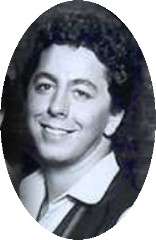Jacques Morali
Jacques Morali (4 July 1947 – 15 November 1991[1]) was a groundbreaking French Disco & Dance music singer/songwriter, producer, arranger and creator of novelty acts like The Ritchie Family and Village People.
Childhood and Youth
Morali was born in Morocco,[2] probably to a Jewish family.[3] raised in dysfunctional home, he used to be dressed as a girl by his mother. by the age of 13, his family has moved to France.
Career
Beginning: in France

He made his start in the music business at the end of the 1960s, writing music for orchestras in Paris, for the Crazy Horse, for himself as a solo artist (he played in 1967 show "Elle aime, elle n'aime pas" and released a single of the same title) but also for performers like Peter Fersen. Viva Zapata (Venus VS-71451), one of his first French productions, was sung by "Clint Farwood" - a pseudonym for a member of King Harvest. In the early 1970s, he met French music producer Henri Belolo. But he thought quickly that his success in France was not as high as expected and started to try his luck in North America. Through meeting José Eber, Elizabeth Taylor and Cher's hairdresser,[4] he became familiar with Philadelphia International Records. At the time, Morali proposed several projects to Belolo without convincing him.
International
In 1975, Morali told Belolo about his intention to adapt the Brazilian song "Brazil" from a musical starring Carmen Miranda. The idea was to make an epic record for the clubs, sung by larger-than-life female singers. Seduced by the idea, Belolo agreed to finance a long-lasting Morali residency at Sigma Sound Studios in Philadelphia. That was the start of their collaboration. They cast three girls (Cheryl Jacks, Cassandra Wooten and Gwendolyn Oliver) and named the band The Ritchie Family. "Brazil" was a solid success, the first of many that made them long-term partners ("The Best Disco In Town" (1976), "Life Is Music" (1977), "African Queens" (1977), "Quiet Village" (1977) & "American Generation" (1978)), both as creator and author, on top of also being writer and editor (Black Scorpio Publishing).
Mainstream
While in New York, Morali attended a costume ball at "Les Mouches", a gay disco in Greenwich Village. As he gazed around the room, he was impressed by all the "macho male stereotypes" portrayed by the party guests. The idea came to him to put together a group of singers and dancers, each one playing a different gay fantasy figure. At first, Belolo was not involved in this project, but when he saw that Morali had succeeded in signing a licensing deal with Casablanca Records (one of the most famous disco labels), Belolo decided to become his close sidekick on the project. The Village People's songs include "San Francisco (You've Got Me)" (1977), "YMCA" (1978), "Macho Man" (1978), "In the Navy" (1979), "Go West" (1980) and "Sex Over the Phone" (1985) and they became one of the most successful acts of the disco era with their flamboyant concept albums.
Jacques Morali worked with professional musicians and was fascinated by their skills. His music was characterized by simple arrangements, joyfully catchy melodies that could easily be remembered by everybody and a unique sense of camp. He became a studio die-hard between 1974 and 1982, recording over 65 albums. He co-wrote songs for many artists including Patrick Juvet, Régine, Dalida, Eric Russell, Cher, Patricia Norton, Julius Brown, Starlight, Diva, Dennis Parker, David London, Wayne Scott, Lova Moor and Pia Zadora. Sigma Sound Studios even opened an office just for him. After the severe disco backlash that occurred in 1980, most everyone seemed to have forgotten Morali's prolific talent, until he struck back in 1984 with worldwide hits for Break Machine and Eartha Kitt.
Death
Morali was infected by HIV in the mid-1980s and died of AIDS in 1991. He was buried in Saint-Paul-de-Vence (France).[1]
References
- 1 2 "The Estate Project". Artistswithaids.org. 1991-11-15. Retrieved 2013-12-05.
- ↑ Talevski, Nick. Rock Obituaries - Knocking On Heaven's Door. Omnibus Press. p. 441.
- ↑ "Jewish Names".
- ↑ "José Eber interview for "Unscripted"". Retrieved September 23, 2009.